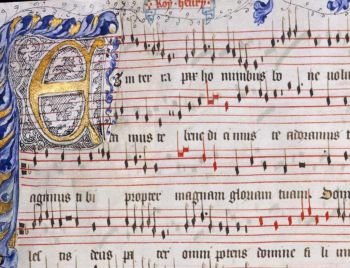Events
Composing from the Historical
Wednesday 27 February 16:00 until 18:00
Fulton 114
Speaker: Tom Armstrong (Surrey), Ed Hughes, Martin Butler (Sussex), Rowland Sutherland (composer)
Part of the series: MFM Research Seminars

The Old Hall Manuscript, British Library (public domain)
Tom Armstrong (Senior Lecturer in Music, Surrey)
Martin Butler (Prof of Music, Sussex)
Ed Hughes (Prof of Composition, Sussex)
Rowland Sutherland (freelance composer, arranger, band leader and flautist)
Chaired by Mimi Haddon (Lecturer in Music, Sussex)
What happens when a composer consciously references or models the music of the past in a new composition? How is this different from transcription or arrangement, and what does it mean?
Looking at recent examples, a special panel of four composer/performers, with expertise from the worlds of jazz, improvisation and contemporary classical music, will address these questions in relation to their individual projects on John Coltrane (1926-1967), Jean-Philippe Rameau (1683-1764), Henry Purcell (1659-1695) and John Cooke (c.1385-?1442).
---
Notes
In June 2014 Rowland Sutherland created and performed the finished version of 'Enlightenment' for the close of the Meltdown Festival in two sold-out performances at London's Queen Elizabeth Hall. The composition featured some of the country's top jazz performers and was written to mark the fiftieth anniversary of the recording of John Coltrane's Album A Love Supreme (1964).
In June 2016 Martin Butler and Peter Wiegold created a re-working of Purcell's King Arthur(1691) for Wilton's Music Hall. This work featured the musicians of Note Inegales (and many others) who specialise in exploring improvisation, composition and performance. The composition is a reworking of Henry Purcell's opera King Arthur, led by co-directors Wiegold and Butler.
In 2014 Tom Armstrong created JPR after Jean-Philippe Rameau (1683-1764). JPR is created entirely from a collage of borrowed materials; all the pitches are Rameau’s and occur in exactly the same metrical positions and within the same formal designs as in the source pieces. The author’s intervention starts and remains within Rameau’s material (via an informal filtering process) so the kind of authorial juxtapositions often found in musical borrowing are absent.
In 2018, Ed Hughes wrote Stella celi extirpavit. A movement for instrumental ensemble and part of a larger piece performed by his ensemble the New Music Players. It paraphrases a short vocal ensemble piece of the same name by John Cooke (c.1385-?1442) ("Star of Heaven who nourished the Lord and rooted up the plague of death").
By: Ian Tout
Last updated: Monday, 25 February 2019